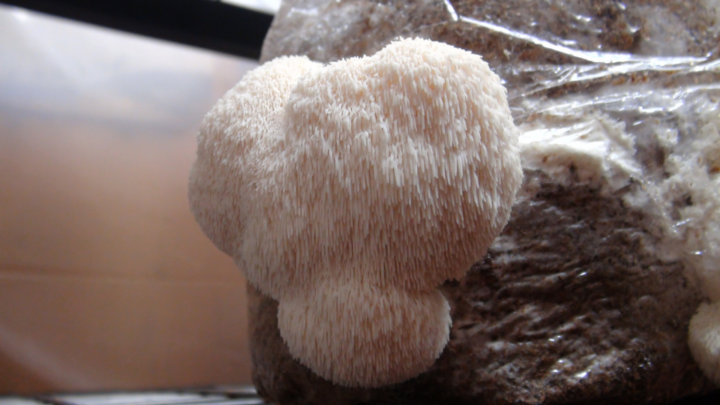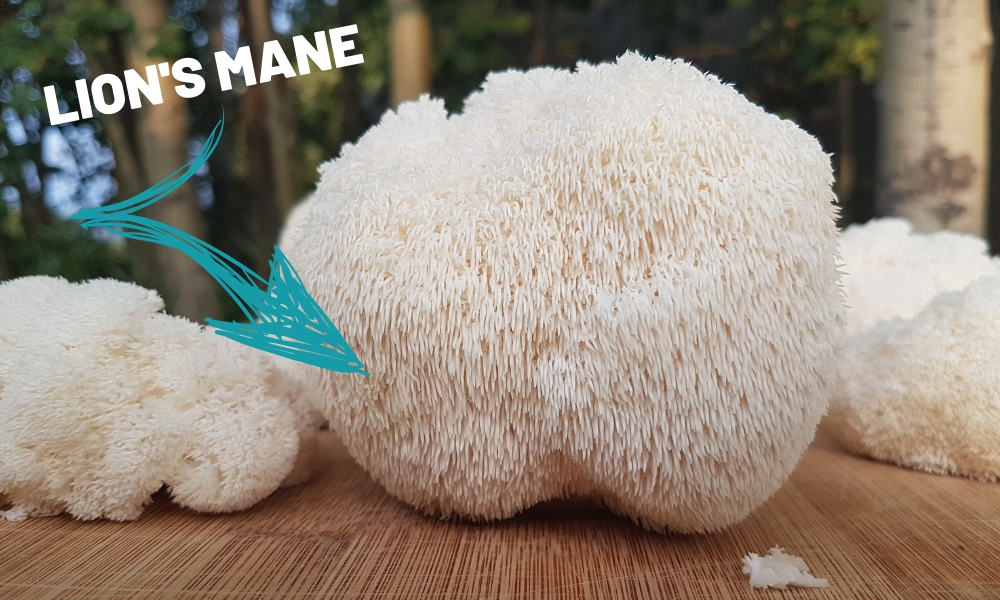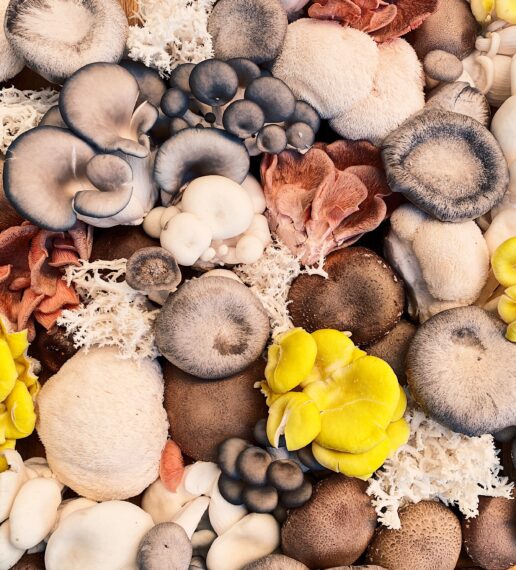Lion’s Mane: A Mushroom For Your Brain and Nerves

With its long shaggy spines that resemble the voluminous mane around a lion’s face, it’s no wonder that Hericium erinaceus is best known as lion’s mane mushroom.
Used for centuries in traditional Chinese medicine to support brain function and neurological health, this edible mushroom has long been valued for its fierce medicinal properties. (1)
Here at FreshCap, we generally don’t like to play favorites among the different mushrooms we offer, but we can’t help ourselves when it comes to lion’s mane mushroom.
Not only is it one of the most spectacular-looking mushrooms you’ll ever see (this fungi really does look like a fun guy!), but it’s also full of health benefits and loaded with flavor when cooked fresh.
If you like crab or lobster meat, then you’ll love the sweet-savory taste and tear-apart texture of lion’s mane.

What is Lion’s Mane?
Also called yamabushitake, pom pom, monkey head, bearded, or hedgehog mushroom, lion’s mane mushroom is native to North America, Europe, and Asia where it grows primarily on decaying or dead hardwood trees.
Expanding well beyond its origins in traditional Chinese medicine, lion’s mane is now commonly used as a natural nootropic (aka “smart drug”) among biohackers and those who want a brain boost to enhance productivity, creativity, and mental stamina.
While more research is needed on the effects of lion’s mane on humans, animal studies so far have been promising. Read on to learn more about how lion’s mane may help you.
Top 7 Benefits of Lion’s Mane
We all know that the lion is king of the jungle. And like the fantastic beast it’s named after, lion’s mane mushroom is one of the most powerful mushrooms on the planet.
In fact, this medicinal mushroom has been shown to have antibiotic, anticancer, antidiabetic, antifatigue, anti-inflammatory, anti-aging, anti-anxiety, cardioprotective, and neuroprotective properties, among many others. (2)
1. Improves Brain Health
One of the most researched and important benefits of lion’s mane mushroom is its impact on the brain and cognitive function, especially when it comes to neurodegenerative diseases such as Alzheimer’s and Parkinson’s. Scientists have found that lion’s mane has two specific compounds—hericenones and erinacines—that can help stimulate the growth of brain cells. (3)
A 2016 report showed that lion’s mane mushroom and its extracts not only decreased symptoms of memory loss in mice with Alzheimer’s disease, but it also prevented neural damage by certain plaques. (4)
What’s more, research has shown that the “polysaccharides in an aqueous extract of the lion’s mane mushroom could induce neuronal differentiation and promote neuronal survival.” (5)
In other words, hot water extracts from lion’s mane mushroom promote neuroregenerative properties that can treat brain damage!
2. Enhances Nerve Function
Your nervous system transmits signals between the brain, spinal cord, and other parts of the body. One of the most revolutionary discoveries about lion’s mane is that it can actually induce nerve growth factor and repair cells more quickly. (6) A 2012 study concluded that consuming lion’s mane mushroom could regenerate damaged cells from peripheral nerve injury. (7)
3. Helps Heart Health
Heart disease is the leading cause of death in the United States and two factors that might increase the risk of heart disease are obesity and high levels of triglycerides (aka bad cholesterol). However, studies conducted in 2013 show that lion’s mane can improve fat metabolism and has potent cholesterol-lowering activity. (8)
Research from Japan suggests that lion’s mane can also help lower the risk of a stroke or heart attack thanks to the hericenone compound that reduces the rate of blood clotting. (9)
4. Supports Immune System
Like all mushrooms, lion’s made is loaded with antioxidants and beta-glucans that fight oxidative stress and help ensure proper immune response. (10)
A study evaluating the therapeutic benefits of 14 different mushroom species found that lion’s mane had the fourth-highest level of antioxidant activity (11) and other studies demonstrate its anti-inflammatory effects for those with inflammatory bowel disease (12) as well as a host of other conditions. (13)
5. Linked to Gut Health
Many of us now know that gut health is directly tied to a strong immune system—after all, 70% to 80% of immune cells are found in the gut. (14) While more human clinical trials are necessary, research done on mice indicates that lion’s mane can help stimulate intestinal immune response (15) and protect cells against bacterial infections and even increase lifespan (16).
6. Relieves Anxiety & Depression
There’s accumulating evidence that suggests inflammation plays a role in depression and anxiety, and anti-inflammatory substances such as lion’s mane extract can help. (17)
A 2018 study on mice demonstrated how lion’s mane extract offered antidepressant-like effects within a two-week period (18) while another study indicated that amycenone—an activator of brain function found in lion’s mane extract—led to anti-inflammatory and antidepressant reactions. (17)
7. Fights Cancer
Growing research shows that lion’s mane might be a strong contender for cancer treatment, in part because of its specific compounds. (19, 20)
Multiple tests have shown that lion’s mane mushroom has anticancer properties for a wide range of the disease including leukemia, stomach cancer, lung cancer, liver cancer, colon cancer, and breast cancer. (21, 22, 23) One study even found that Hericium erinaceus extract significantly reduced cancer cells from metastasizing. (24)
Best Way To Take Lion’s Mane
If you can find it fresh, you should definitely try cooking up some lion’s mane mushroom in your next recipe.
Not only is it tasty, but as you’ve learned, it has plenty of benefits beyond flavor.
That said, it’s not exactly easy to find. You’re probably better off using lion’s mane supplements like our powerful powdered extract so you can reap the rewards of its healing properties in a concentrated amount.
Lion’s Mane Mushroom Powder
Lion’s mane mushroom extract powder is made by harvesting whole mushroom fruiting bodies, and then performing a hot water extraction (sort of like making soup stock or bone broth) to maintain its beneficial properties. (5)
Once that’s done, the liquid is spray-dried into a fine powder that can be encapsulated or added to coffee, teas, smoothies, or any other food.
Where to Buy Lion’s Mane Mushroom
For fresh lion’s mane, check your local farmers’ market or Asian market. Although not nearly as common as other culinary mushrooms, it’s not unheard of to find lion’s mane at health food stores or organic markets. You can always check with your local grocer to see if it can be special ordered. But as mentioned, it’s probably easiest to simply buy lion’s mane supplements online.
Just make sure to purchase from a reputable supplier (like us!) that’s been properly vetted and only sells 100% pure extract with no added fillers, grain, or starch.
Live Well
There’s no doubt that lion’s mane is a king among fungi. From regenerating nerve growth in the brain to improving mental clarity and boosting immunity, this eye-catching mushroom is certainly one to consider for overall well-being.
Of course, always seek the medical advice of your doctor before starting any dietary supplement to avoid any potential mishaps. And remember: if lion’s mane doesn’t make you roar with delight, no worries.
You can always take our quiz to find which medicinal mushroom is right for you!

